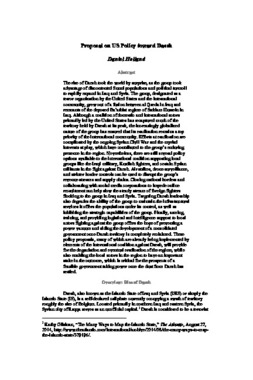Proposal on US Policy toward Daesh Undergraduate
Abstract
The rise of Daesh took the world by surprise, as the group took advantage of discontented Sunni populations and political turmoil to rapidly expand in Iraq and Syria. The group, designated as a terror organization by the United States and the international community, grew out of a fusion between al Qaeda in Iraq and remnants of the deposed Ba'athist regime of Saddam Hussein in Iraq. Although a coalition of domestic and international actors primarily led by the United States has recaptured much of the territory held by Daesh at its peak, the increasingly globalized nature of the group has ensured that its eradication remains a top priority of the international community. Efforts at eradication are complicated by the ongoing Syrian Civil War and the myriad interests at play, which have contributed to the group's enduring presence in the region. Nevertheless, there are still several policy options available to the international coalition supporting local groups like the Iraqi military, Kurdish fighters, and certain Syrian militants in the fight against Daesh. Air strikes, drone surveillance, and stricter border controls can be used to disrupt the group's revenue streams and supply chains. Closing national borders and collaborating with social media corporations to impede online recruitment can help slow the steady stream of foreign fighters flocking to the group in Iraq and Syria. Targeting Daesh leadership also degrades the ability of the group to maintain the infrastructural services it offers the populations under its control, as well as inhibiting the strategic capabilities of the group. Finally, arming, training, and providing logistical and intelligence support to local actors fighting against the group offers the hope of preventing a power vacuum and aiding the development of a consolidated government once Daesh territory is completely reclaimed. These policy proposals, many of which are already being implemented by elements of the international coalition against Daesh, will provide for the degradation and eventual eradication of the regime, while also enabling the local actors in the region to have an important stake in the outcome, which is critical for the prospects of a feasible government taking power once the dust from Daesh has settled. About Daniel Holland Daniel Holland was a senior at the University of Oklahoma pursuing a joint Bachelor of Arts and a Master of Arts in International Studies, as well as a Bachelor of Arts in Letters with a focus on Constitutional Studies. He attended OU on a National Merit scholarship, and was an active participant in campus life, working with organizations such as The Oklahoma Group, The Honors Undergraduate Research Journal, and Crimson Club. Upon graduation, he planned to work as an international correspondent, bringing underreported stories from conflict areas to the general public. He had a strong belief in the responsibilities of media organizations, both to empower their audiences to make educated and empathetic observations about the world around them, and to inspire their audiences to be the change they wish to see in the world.

